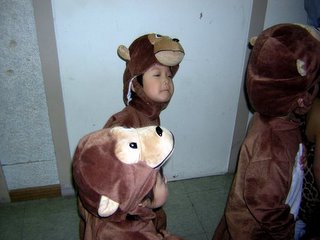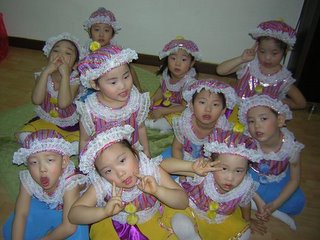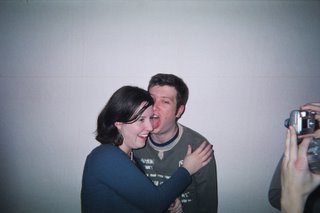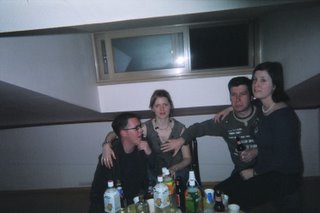I had always wanted to know when the left was going to do this, start to turn the US public against the US Military, this will be the first shot of many comming. I really can not believe that he said this, please read and write to the LA Times and ask for his removial, I have been to Germany and I did not just sit either, what a liar this man is.
Joel Stein
Warriors and wusses
I DON'T SUPPORT our troops. This is a particularly difficult opinion to have, especially if you are the kind of person who likes to put bumper stickers on his car. Supporting the troops is a position that even Calvin is unwilling to urinate on.
I'm sure I'd like the troops. They seem gutsy, young and up for anything. If you're wandering into a recruiter's office and signing up for eight years of unknown danger, I want to hang with you in Vegas.
And I've got no problem with other people — the ones who were for the Iraq war — supporting the troops. If you think invading Iraq was a good idea, then by all means, support away. Load up on those patriotic magnets and bracelets and other trinkets the Chinese are making money off of.
But I'm not for the war. And being against the war and saying you support the troops is one of the wussiest positions the pacifists have ever taken — and they're wussy by definition. It's as if the one lesson they took away from Vietnam wasn't to avoid foreign conflicts with no pressing national interest but to remember to throw a parade afterward.
Blindly lending support to our soldiers, I fear, will keep them overseas longer by giving soft acquiescence to the hawks who sent them there — and who might one day want to send them somewhere else. Trust me, a guy who thought 50.7% was a mandate isn't going to pick up on the subtleties of a parade for just service in an unjust war. He's going to be looking for funnel cake.
Besides, those little yellow ribbons aren't really for the troops. They need body armor, shorter stays and a USO show by the cast of "Laguna Beach."
The real purpose of those ribbons is to ease some of the guilt we feel for voting to send them to war and then making absolutely no sacrifices other than enduring two Wolf Blitzer shows a day. Though there should be a ribbon for that.
I understand the guilt. We know we're sending recruits to do our dirty work, and we want to seem grateful.
After we've decided that we made a mistake, we don't want to blame the soldiers who were ordered to fight. Or even our representatives, who were deceived by false intelligence. And certainly not ourselves, who failed to object to a war we barely understood.
But blaming the president is a little too easy. The truth is that people who pull triggers are ultimately responsible, whether they're following orders or not. An army of people making individual moral choices may be inefficient, but an army of people ignoring their morality is horrifying. An army of people ignoring their morality, by the way, is also Jack Abramoff's pet name for the House of Representatives.
I do sympathize with people who joined up to protect our country, especially after 9/11, and were tricked into fighting in Iraq. I get mad when I'm tricked into clicking on a pop-up ad, so I can only imagine how they feel.
But when you volunteer for the U.S. military, you pretty much know you're not going to be fending off invasions from Mexico and Canada. So you're willingly signing up to be a fighting tool of American imperialism, for better or worse. Sometimes you get lucky and get to fight ethnic genocide in Kosovo, but other times it's Vietnam.
And sometimes, for reasons I don't understand, you get to just hang out in Germany.
I know this is all easy to say for a guy who grew up with money, did well in school and hasn't so much as served on jury duty for his country. But it's really not that easy to say because anyone remotely affiliated with the military could easily beat me up, and I'm listed in the phone book.
I'm not advocating that we spit on returning veterans like they did after the Vietnam War, but we shouldn't be celebrating people for doing something we don't think was a good idea. All I'm asking is that we give our returning soldiers what they need: hospitals, pensions, mental health and a safe, immediate return. But, please, no parades.
Seriously, the traffic is insufferable.
Mr Stein please feel free to talk to me and I will be more than happy to explain my logic to you....
Tuesday, January 31, 2006
Sunday, January 29, 2006
Today is Lunar New Year of the Dog.
Chinese New Year (Chinese: 春節, 春节, Chūnjíe; or 農曆新年, 农历新年, Nónglì Xīnnián), also known as the Lunar New Year or the Spring Festival is the most important of the traditional Chinese holidays. It consists of a period of celebrations, starting on New Year's Day, celebrated on the first day of the first month of the Chinese calendar, i.e. the day of the second new moon after the day on which the winter solstice occurs, unless there is an intercalary eleventh or twelfth month in the lead-up to the New Year—in such a case, the New Year falls on the day of the third new moon after the solstice. (The next time this occurs is in 2033.) The Chinese New Year period ends with the Lantern Festival, on the fifteenth day of the festival.
Legend has it that in ancient China, Nian ("Nyehn") was a man-devouring predator beast that could infiltrate houses silently. The Chinese soon learned that Nian was sensitive to loud noises and the color red, and they scared it away with explosions, fireworks and the liberal use of color red domestically. These customs led to the first New Year celebrations.
Celebrated internationally in areas with large populations of ethnic Chinese, Chinese New Year is considered to be a major holiday for the Chinese as well as ethnic groups such as the Mongolians, Koreans, the Miao (Chinese Hmong), the Vietnamese (see Tết), Tibetans, the Nepalese and the Bhutanese (see Losar) who were influenced by Chinese culture in terms of religious and philosophical worldview, language and culture in general. Chinese New Year is also the time when the largest human migration takes place when Chinese all around the world return home on the eve of Chinese New Year to have reunion dinners with their families.
The dog (狗; pinyin: gǒu) is one of the 12-year cycle of animals which appear in the Chinese zodiac related to the Chinese calendar. According to Chinese folklore, each animal is associated with certain personality traits. People born in this year are loyal, honest, and trustworthy, but can also be stubborn and selfish. Dogs get along with Horses, Rabbits, and Tigers. People born in dog years may encounter discrimination in China during 2006, due to the belief that they will attract bad luck during the year. They may be denied jobs, homes, and other amenities by those who fear to be caught in whatever misfortunes befall them.
So Happy Year of the Dog!
Chinese New Year (Chinese: 春節, 春节, Chūnjíe; or 農曆新年, 农历新年, Nónglì Xīnnián), also known as the Lunar New Year or the Spring Festival is the most important of the traditional Chinese holidays. It consists of a period of celebrations, starting on New Year's Day, celebrated on the first day of the first month of the Chinese calendar, i.e. the day of the second new moon after the day on which the winter solstice occurs, unless there is an intercalary eleventh or twelfth month in the lead-up to the New Year—in such a case, the New Year falls on the day of the third new moon after the solstice. (The next time this occurs is in 2033.) The Chinese New Year period ends with the Lantern Festival, on the fifteenth day of the festival.
Legend has it that in ancient China, Nian ("Nyehn") was a man-devouring predator beast that could infiltrate houses silently. The Chinese soon learned that Nian was sensitive to loud noises and the color red, and they scared it away with explosions, fireworks and the liberal use of color red domestically. These customs led to the first New Year celebrations.
Celebrated internationally in areas with large populations of ethnic Chinese, Chinese New Year is considered to be a major holiday for the Chinese as well as ethnic groups such as the Mongolians, Koreans, the Miao (Chinese Hmong), the Vietnamese (see Tết), Tibetans, the Nepalese and the Bhutanese (see Losar) who were influenced by Chinese culture in terms of religious and philosophical worldview, language and culture in general. Chinese New Year is also the time when the largest human migration takes place when Chinese all around the world return home on the eve of Chinese New Year to have reunion dinners with their families.
The dog (狗; pinyin: gǒu) is one of the 12-year cycle of animals which appear in the Chinese zodiac related to the Chinese calendar. According to Chinese folklore, each animal is associated with certain personality traits. People born in this year are loyal, honest, and trustworthy, but can also be stubborn and selfish. Dogs get along with Horses, Rabbits, and Tigers. People born in dog years may encounter discrimination in China during 2006, due to the belief that they will attract bad luck during the year. They may be denied jobs, homes, and other amenities by those who fear to be caught in whatever misfortunes befall them.
So Happy Year of the Dog!
Monday, January 23, 2006



Well Saturday was fun, It was the best of times. It was the worst of times.
Well it started out as a great day, I took the bosses son and his friend to see another English film, we saw Narnia. They liked it and we had a great time.
I got a call that my friends variety show was going to start, so I went back home and met them all downstairs. We walked to the building where it was going to be presented.
I was looking at all of these outfits and I was LOL. It just looked liked a very bad hair day, some of these outfits were just soooooooo. funny.
I sat and watched all 2.25 hours of this torture, they are my friends and you just know when to shut up and watch a huge train wreck in progress. It was soooooo awful. It reminded me of a Simpson show where the principal puts out a card that sated you can not leave when your child is done. The parents seemed to love it. I was sooooooo glad that it was over. I scene got to me, it was when the fathers were dancing with their daughters and I started to cry. I was missing the fact that I may never get to do that with my own daughter.
I helped them pack up their items, hey I can carry a lot. We went back to their school and it was time for dinner. The things started to take a turn for the worse.
One of the foreign teachers at their school, will not eat meat, why I have no idea, but that's her thing. At first all they had for her was cold noodles and she got angry ( to be honest I really cant blame her on this one, If its the first time O.K. error but this was like the 4-5th time) and I saw that she was getting ticked off.
Earlier we had talked about going to the cool bar to see a live band, So I was talking about that and rating each Korean teacher at their school, Hey I am a single guy and guys do these stupid things.
Me and the other male teacher who works their, were talking about movies, music, food, girls, rating the girl teachers (the things most guys talk about) I had also mentioned that I now have Brokeback Mountain, the gay cowboy movie, on DVD and that was a running joke for the rest of the night.
After dinner I was going home when their owner, grabbed me and said lets go drinking, I looked at my watch and it was still early, so why not.... Thinking back I wish that I had just went home or just gone straight to the cool bar.
I am being very diplomatic here but I WILL SAY THIS, I know when to cross a line and when never to cross a line, their owner crossed a huge line, a I thought that I was going to have to break up a huge fight, The owner did something that I would never even think about doing. I asked the foreign guy are you cooled down? (I know this is not making scenes but it involved his soon to be wife and their owner and it could have had gotten very ugly and fast) It got tense for a few moments, that pretty much killed that party. We left and on the way home one of the little girls stated, I walking with "..... Mommy and Santa." (She was one of the students who I played Santa for that day.) I was just so cute that I was laughing.
I never got a call so I had no idea if they went to see the live band but when I saw another's persons blog, it looked liked it had gotten worse their. To be honest, I really don't go to the bars here in Daejeon much anymore, Their is a sportsbar that shows NFL games so I go to that one, but for the rest, it just seems to me to be too much bull shit and way too much drama. Their is a small gathering on Tuesday that I do near my house and its great but after that I really don not like the bull shit that these clubs or stupid people seem to create.
I have had a few people hate me and they do not even know me, I told them that I am a GOP person in Politics and they hate me and they do not even know me, AND THEY WONDER WHY I THINK THEIR PARTY IS A JOKE? I have no problem if you know me and you do not like me, that is a part of life, but to hate me and you do not know me is funny. I have met a few Canadians here, some cool ones and some who just hate the USA, Once again no worries, you can hate on me that way all you want but then when you want something the hate of me goes away. My co-worker told me a story about a few of her friends from England, they made a bet if they met anyone from Canada, the first thing they would say is that they are so much better than the USA, Well they did and it happened just as they said that it would.
No for those who think that I hate Canadians, I don't, I just hate those who dump on the USA and haven't a clue in their head what they are talking about. I am from Texas, USA. So I really did not follow Canada that much in College or after, I was more worried about the problems from Mexico, so I always watched down south then up north.
What I really find annoying is those who want to debate me on my Pro-War stance and they never even did a day of military service for their own country. How in the hell can we even have a common frame if you haven't walked where I have walked? I can not understand them because I haven't walked in their paths either.
that's why I pretty much avoids the clubs downtown, I usually go to the movies and watch a Korean or an US film. I like my drama to be left on the movie screens.
Of all of the people here I feel the most sorry for is my awesome co-worker, Stephanie Shimko. She is from Pittsburgh PA (We are going to watch her team clinch a spot on the Super Bowl after work at the sports bar tonight). I can only think of when she heard that a fellow American is coming to DAEJEON, to teach with her, hopefully he is a liberal just like me, What does she end up with...ME!!!!
Right Wing- Pro War anti- Democratic Party to the max. We do get along, we do have our bumps in the road but when you have 2 people with opposite views this will happen, to be quite honest I am so glad that I am working with her, she even got me reading "The Economist" now. I like the magazine, I do not like the Anti-Bush BS but the world views are well written.
On Tuesdays, I go to A place called the "Beer Hunter" from 2100-2400 hrs it is half price on Beer. We have a small glass (woman glass for 1000 won) or the man beer (1 LTR for 2000 won) I have met people from Canada, USA, New Zealand, Australia, Belgium and other places in the world, its a small club and I like it their.
This was a rather long update, just wanted to keep you all abrest with the pro's and caon's of my little spot in the world.

Well it was time to say goodbye.
As I am getting older in my life, I have come to realize to be grateful for the people who happen to share the space with you. Ben and Carrie are two of these people.
I went to their wedding in October and they left Korea last week due to the US Army sending Ben to Virginia. It was nice to see these 2 become friends then lovers then man and wife. I wish my friends the best in life and hopefully at their real wedding in 2007, I will be blessed to attend.
Good bye my freinds and good luck.
Friday, January 13, 2006

Wow this is post 101.

Well for all those who know, I graduated from The University Of North Texas
When I cheer for a College football team its my UNT Mean Green.
When I saw the NCAA BCS game for the title between UT and USC, I cheered for Texas, I am from Texas and I wanted A Texas team to win it. I got so sick of listening and reading ESPN.COM for their USC is so great bs, it just made me want to puke and when I saw this ad after the game, it just made me laugh.
Awesome.
Sunday, January 08, 2006

It was the New Years Party that I went to. I must say that I am so glad that I did. We talked, we drank and I got FLASHED! It was a fun time had by all as you can tell by the photos. (Sorry but these are the funny ones)


True Loves first kiss of the new year. Way to go.

WELL ITS JUST Dan being DAN.
A few days after the party I took Dan to a sports bar here in Daejeon to see the Texas-USC game, Dan had never seen an American football game before so it was interesting to see his reaction to it all. He likes cheese sticks I found out, he said that they did not have this in New Zealand.
It was a great night and allot better than new years 2005 was for me. For this year, Id like to try and find a girlfriend. My luck with the ladies is still the same for those who knew me back in the states. NONE! I went on one date in 2005 and it was my usual disaster, I have told the story to my friends and those who know it all laughed. It made my friends laugh so the night was not a total loss.
Try and loose some weight, no more sugar and other things for awhile.
Get closer to God. I always need to work on that one.
Try not and be so lonely. I seem to have that bad habbit, but oh well, need to work on that.
Try and be a better friend and a better person are 2 that we can all try and do.
Oh well, Happy 2006! I will revisit this, next year, If the good Lord is willing.
Tuesday, January 03, 2006
HAPPY new Year From Korea. http://english.chosun.com/w21data/html/news/200601/200601010001.html
Well written. Party photos to follow in a few days
World Standard Time and Korean Time in 2006
As individuals weave their lives into the fabric of time, so do nations, and the life of a country, just like the life of a man, is measured by what it has done with the time allotted, what history it has built from the raw material of passing time.
The fate of three Northeast Asian countries -- Korea, China and Japan -- 100 years ago was determined by the time they lived through. While Korea and China were clinging to a vanishing pre-modern and semi-feudal era, Japan alone crossed the threshold to modernity. Korea and China were mere outposts, but Japan made the leap into the standard time of world history. That is what divided the three into a colony, semi-colony and colonizing power.
The 60 years of the Republic of Korea since its independence in 1945 are the history of our desperate endeavor to catch up with modern times, seeking an entry point to the standard time of world history we forfeited in 1905. The fact that our per-capita income hovered around $60 in the 1960 means that our entire population was perforce held up in pre-modern times. In only 40 years we moved on ahead, achieved a per-capita income of $15,000 and joined the ranks of the world's 10 biggest trading nations. We too had at last come in from the backwaters of history to world standard time. That is the history of the Republic of Korea.
Many around the world who had witnessed these developments were stunned to hear that history disparaged as a defeat of justice and a victory for opportunism. That is not to argue that our recent history has been flawless. But from a vantage of world history, it is a textbook case for erring so little and achieving so much.
We are not alone. China, with a population of 1.3 billion, labored under pre-modern conditions, starvation and famine during its 50-year semi-colonial status and 30 years as a Communist dictatorship. Now it, too, it is finding its feet. If Korea has performed a shortened version of Japan's 100-year history in 40 years, China is racing toward shortening our run to 20 years. Under a principle of nurturing its strength in secret, China once preferred a low profile, hiding its light under a bushel, but now it is becoming more assertive when that is necessary.
It is perhaps natural that Japan is now trying to strengthen its alliance with the U.S. and that some in the country insist that Japan should engage in more activities abroad like many others, with a recovered pride befitting its status as the world’s second largest economy with a population of 120 million.
Yet today, only two of the Northeast Asian nations that were not so long ago vying to emerge from their historic backwater are competing at the center of world history. China is bracing itself to provide a counterbalance to the U.S., and Japan envisages a policy of reining in China's regional hegemony in alliance with America. The U.S., meanwhile, has embraced Japan to employ a dual strategy of restraining and cooperating with China.
What the three powers have in common is that Korea hardly figures on their map. They discuss it only when they are talking about struggling North Korea, a country caged in pre-modern failure but trying to embrace the bane of modernity, nuclear weapons.
No matter that we have progressed in leaps and bounds, we have been erased from their minds. A mere 15 years ago, Deng Xiaoping told his people to learn from South Korea; now China barely gives us a second thought.
It only took a few years for that to happen. “I will not be concerned at other men's not knowing me," says Confucius. "I will be concerned at my own want of ability.” And it has been Korea's want of ability that in the last few years has made it drop out of the future-bound race among the three Northeast Asian neighbors, where one led one moment and another the next, and retreated into the past. It is our leaders we have to thank for this, with their insistence that we can only have a future if we right the wrongs of the past, and their refusal to brook any debate whether that is true.
No country in the world has ever built a present and a future from righting the past alone. Far from it: leading powers glorify their past to according to their present and future needs. There can be no more accurate gauge of where we stand today than the fact that the government’s biggest project for the decisive year 2006 remains the righting of past wrongs. We now live in a paradoxical land where the present is the past and the past the present.
That is why, in 2006, we will have to be more vigilant than ever of developments at home and abroad, observing closely not only how the government will rewrite our history but also how local elections in May will more sharply distinguish those who can take us into the future from those who want to hobble us to the past.
That also goes for the direct and indirect judicial reforms that will among other things replace a majority of judges in the supreme and constitutional courts. If we let an administration with only a year before its tenure expires name the dignitaries who will sit in judgment over us in the two courts for the next six years, it will be tantamount to extending the lifespan of a government whose constitutional life is over.
The people must be watchful as hawks, too, lest the antiquated ideology our country’s left wing is refusing to consign to the dustbin of history fatally undermine the market economy, which alone sustains South Korea's prosperity. Another task, equally important, is to observe the injured Korea-U.S. alliance and make a carefully considered strategic judgment about what an alliance should be and what allies we will need, not merely for the immediate challenge of resolving the North Korean nuclear problem, but also for the era of unification, when it comes, and in the decades beyond.
Amid all this, we cannot shirk a responsibility to help release our brothers and sisters in North Korea from a prison that time forgot into the daylight of the 21st century so that they, too, can live their lives by world standard time.
Success or failure in the New Year will be determined by our ability to defend development in lockstep with 21st century standard time, and with it the future entrusted to us by the earlier generations who created and nurtured the Republic of Korea, against the forces who would return us to a historical backwater.
We stand at a fork in the road. To one side lies the way to a prosperous future keeping time with our regional neighbors and a role on the world stage. To the other lies the cul-de-sac of parochialism and regression. Let us make the right choice.
Well written. Party photos to follow in a few days
World Standard Time and Korean Time in 2006
As individuals weave their lives into the fabric of time, so do nations, and the life of a country, just like the life of a man, is measured by what it has done with the time allotted, what history it has built from the raw material of passing time.
The fate of three Northeast Asian countries -- Korea, China and Japan -- 100 years ago was determined by the time they lived through. While Korea and China were clinging to a vanishing pre-modern and semi-feudal era, Japan alone crossed the threshold to modernity. Korea and China were mere outposts, but Japan made the leap into the standard time of world history. That is what divided the three into a colony, semi-colony and colonizing power.
The 60 years of the Republic of Korea since its independence in 1945 are the history of our desperate endeavor to catch up with modern times, seeking an entry point to the standard time of world history we forfeited in 1905. The fact that our per-capita income hovered around $60 in the 1960 means that our entire population was perforce held up in pre-modern times. In only 40 years we moved on ahead, achieved a per-capita income of $15,000 and joined the ranks of the world's 10 biggest trading nations. We too had at last come in from the backwaters of history to world standard time. That is the history of the Republic of Korea.
Many around the world who had witnessed these developments were stunned to hear that history disparaged as a defeat of justice and a victory for opportunism. That is not to argue that our recent history has been flawless. But from a vantage of world history, it is a textbook case for erring so little and achieving so much.
We are not alone. China, with a population of 1.3 billion, labored under pre-modern conditions, starvation and famine during its 50-year semi-colonial status and 30 years as a Communist dictatorship. Now it, too, it is finding its feet. If Korea has performed a shortened version of Japan's 100-year history in 40 years, China is racing toward shortening our run to 20 years. Under a principle of nurturing its strength in secret, China once preferred a low profile, hiding its light under a bushel, but now it is becoming more assertive when that is necessary.
It is perhaps natural that Japan is now trying to strengthen its alliance with the U.S. and that some in the country insist that Japan should engage in more activities abroad like many others, with a recovered pride befitting its status as the world’s second largest economy with a population of 120 million.
Yet today, only two of the Northeast Asian nations that were not so long ago vying to emerge from their historic backwater are competing at the center of world history. China is bracing itself to provide a counterbalance to the U.S., and Japan envisages a policy of reining in China's regional hegemony in alliance with America. The U.S., meanwhile, has embraced Japan to employ a dual strategy of restraining and cooperating with China.
What the three powers have in common is that Korea hardly figures on their map. They discuss it only when they are talking about struggling North Korea, a country caged in pre-modern failure but trying to embrace the bane of modernity, nuclear weapons.
No matter that we have progressed in leaps and bounds, we have been erased from their minds. A mere 15 years ago, Deng Xiaoping told his people to learn from South Korea; now China barely gives us a second thought.
It only took a few years for that to happen. “I will not be concerned at other men's not knowing me," says Confucius. "I will be concerned at my own want of ability.” And it has been Korea's want of ability that in the last few years has made it drop out of the future-bound race among the three Northeast Asian neighbors, where one led one moment and another the next, and retreated into the past. It is our leaders we have to thank for this, with their insistence that we can only have a future if we right the wrongs of the past, and their refusal to brook any debate whether that is true.
No country in the world has ever built a present and a future from righting the past alone. Far from it: leading powers glorify their past to according to their present and future needs. There can be no more accurate gauge of where we stand today than the fact that the government’s biggest project for the decisive year 2006 remains the righting of past wrongs. We now live in a paradoxical land where the present is the past and the past the present.
That is why, in 2006, we will have to be more vigilant than ever of developments at home and abroad, observing closely not only how the government will rewrite our history but also how local elections in May will more sharply distinguish those who can take us into the future from those who want to hobble us to the past.
That also goes for the direct and indirect judicial reforms that will among other things replace a majority of judges in the supreme and constitutional courts. If we let an administration with only a year before its tenure expires name the dignitaries who will sit in judgment over us in the two courts for the next six years, it will be tantamount to extending the lifespan of a government whose constitutional life is over.
The people must be watchful as hawks, too, lest the antiquated ideology our country’s left wing is refusing to consign to the dustbin of history fatally undermine the market economy, which alone sustains South Korea's prosperity. Another task, equally important, is to observe the injured Korea-U.S. alliance and make a carefully considered strategic judgment about what an alliance should be and what allies we will need, not merely for the immediate challenge of resolving the North Korean nuclear problem, but also for the era of unification, when it comes, and in the decades beyond.
Amid all this, we cannot shirk a responsibility to help release our brothers and sisters in North Korea from a prison that time forgot into the daylight of the 21st century so that they, too, can live their lives by world standard time.
Success or failure in the New Year will be determined by our ability to defend development in lockstep with 21st century standard time, and with it the future entrusted to us by the earlier generations who created and nurtured the Republic of Korea, against the forces who would return us to a historical backwater.
We stand at a fork in the road. To one side lies the way to a prosperous future keeping time with our regional neighbors and a role on the world stage. To the other lies the cul-de-sac of parochialism and regression. Let us make the right choice.
Subscribe to:
Comments (Atom)